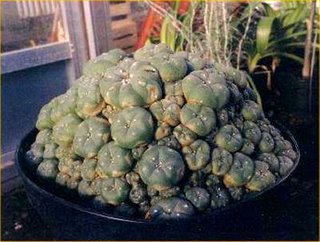 I don't known anyone who has tried this. It may be safe, but I am still afraid. It is after all a spirit cactus.
I don't known anyone who has tried this. It may be safe, but I am still afraid. It is after all a spirit cactus."In the first study of its kind, researchers have found that peyote -- for now, the only legal hallucinogenic drug in the United States -- doesn't rob regular users of brain power over time. While the findings don't directly indicate anything about the safety of psychedelic drugs like LSD and mushrooms, they do suggest that at least one hallucinogen is OK to use for months or even years.
"We really weren't able to find any (mental) deficits," said Dr. John Halpern, associate director of substance abuse research at McLean Hospital in Belmont, Massachusetts, and co-author of the study, released today in the Nov. 4 issue of the journal Biological Psychiatry. Hallucinogenic drugs have long fascinated researchers, who are now studying whether they hold the potential to treat mental illnesses like depression and obsessive-compulsive disorder.
But little is known about the long-term effects of hallucinogenic use. Part of the problem is that many users -- such as LSD aficionados -- take a variety of other drugs, so it's hard to tease out the specific effects of psychedelic drugs.
Enter peyote, currently the only hallucinogenic drug legally allowed for use outside research labs (although that may change). Compared with LSD and mushrooms, peyote is a bit obscure, with its use -- at least legally -- limited to the sacramental rites of the Native American Church, which has as many as 300,000 members. Many peyote users don't take other drugs, making them ideal subjects for hallucinogenic research.
Peyote comes from the crowns of a cactus that grows in northern Mexico and parts of Texas. Harvesters cut off the crown, dry it and sell it in "buttons," Halpern said. Generally, users eat the buttons whole or grind them up into a powder that can be mixed into food or brewed into a tea.
When enough peyote is eaten, users enter a hallucinogenic state thanks to its active ingredient, the chemical mescaline. Halpern and colleagues recruited three groups of Navajos -- 61 members of the Native American Church who regularly ate peyote, 36 alcoholics who have been dry for at least two months and 79 people who reported little or no use of alcohol or drugs. The researchers then gave mental-health and cognitive tests to the subjects."
- Randy Dotinga, Wired.


No comments:
Post a Comment